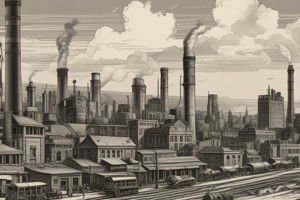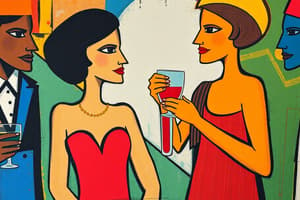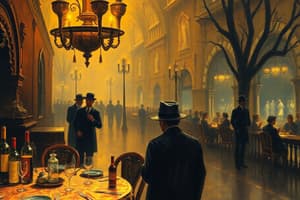Podcast
Questions and Answers
The ______ was a period of widespread racial violence in the United States, particularly during the summer months of 1919.
The ______ was a period of widespread racial violence in the United States, particularly during the summer months of 1919.
Red Summer
The ______ Massacre was a brutal event in Arkansas where hundreds of Black people were killed by white mobs.
The ______ Massacre was a brutal event in Arkansas where hundreds of Black people were killed by white mobs.
Elaine
The ______ Race Riot was sparked by the drowning of a young Black man, Eugene Williams.
The ______ Race Riot was sparked by the drowning of a young Black man, Eugene Williams.
Chicago
The Tulsa Massacre took place in the ______ District, a thriving Black community often referred to as "Black Wall Street."
The Tulsa Massacre took place in the ______ District, a thriving Black community often referred to as "Black Wall Street."
The Tulsa Massacre destroyed ______ structures in the Greenwood District.
The Tulsa Massacre destroyed ______ structures in the Greenwood District.
The Tulsa Massacre resulted in the deaths of between ______ people.
The Tulsa Massacre resulted in the deaths of between ______ people.
The ______ Commission Report determined that government authorities failed to adequately respond to the violence during the Tulsa Massacre.
The ______ Commission Report determined that government authorities failed to adequately respond to the violence during the Tulsa Massacre.
The ______ was a prominent African American community in Tulsa, Oklahoma, destroyed during the Tulsa Massacre.
The ______ was a prominent African American community in Tulsa, Oklahoma, destroyed during the Tulsa Massacre.
The Tulsa Massacre occurred in ______ 1921.
The Tulsa Massacre occurred in ______ 1921.
The ______ determined that the charges against Dick Rowland, the catalyst for the Tulsa Massacre, were highly suspect.
The ______ determined that the charges against Dick Rowland, the catalyst for the Tulsa Massacre, were highly suspect.
The invention of the ______ line allowed for mass production at cheaper costs.
The invention of the ______ line allowed for mass production at cheaper costs.
The ______ Amendment gave white women the right to vote in the United States.
The ______ Amendment gave white women the right to vote in the United States.
The Harlem Renaissance was a cultural movement that blossomed in the ______.
The Harlem Renaissance was a cultural movement that blossomed in the ______.
The ______ Revolution in Russia, which led many to fear that immigrants intended to overthrow the United States government.
The ______ Revolution in Russia, which led many to fear that immigrants intended to overthrow the United States government.
The Palmer Raids were named after Attorney General ______.
The Palmer Raids were named after Attorney General ______.
Sacco and Vanzetti were suspected ______ who were convicted of murder.
Sacco and Vanzetti were suspected ______ who were convicted of murder.
The ______ Scare was a period of intense anti-communist and anti-immigrant sentiment in the United States.
The ______ Scare was a period of intense anti-communist and anti-immigrant sentiment in the United States.
The discovery of ______ helped improve the overall health of the average American.
The discovery of ______ helped improve the overall health of the average American.
The ______ of the assembly line allowed for mass production at cheaper costs.
The ______ of the assembly line allowed for mass production at cheaper costs.
The introduction of consumer ______ allowed people to buy goods on borrowed money.
The introduction of consumer ______ allowed people to buy goods on borrowed money.
The ______ Renaissance was a cultural movement that celebrated African American art, literature, and music.
The ______ Renaissance was a cultural movement that celebrated African American art, literature, and music.
The ______ Migration brought a large influx of African Americans to Northern cities.
The ______ Migration brought a large influx of African Americans to Northern cities.
The ______ Police Strike in 1919 fueled concerns about radicalism in the United States.
The ______ Police Strike in 1919 fueled concerns about radicalism in the United States.
The ______ of WWI saw the rise of communism in Europe.
The ______ of WWI saw the rise of communism in Europe.
______ & Vanzetti were suspected anarchists who were convicted of murder.
______ & Vanzetti were suspected anarchists who were convicted of murder.
The Roaring 20s followed the end of ______ in 1918.
The Roaring 20s followed the end of ______ in 1918.
The introduction of ______ allowed national broadcasting for the first time.
The introduction of ______ allowed national broadcasting for the first time.
In the 1920s, the first Trans-Atlantic ______ call occurred.
In the 1920s, the first Trans-Atlantic ______ call occurred.
Henry Ford is known for inventing the ______ line, which revolutionized car manufacturing.
Henry Ford is known for inventing the ______ line, which revolutionized car manufacturing.
The introduction of ______ food changed the food industry by making seasonal foods available year round.
The introduction of ______ food changed the food industry by making seasonal foods available year round.
Many Americans began buying ______ clothing, which was produced entirely in factories.
Many Americans began buying ______ clothing, which was produced entirely in factories.
Mass publication and ______ allowed advertisements to reach American homes.
Mass publication and ______ allowed advertisements to reach American homes.
The widespread use of cars resulted in the ______ growth of cities.
The widespread use of cars resulted in the ______ growth of cities.
Flashcards
The Roaring Twenties
The Roaring Twenties
The post-World War I era in the United States, characterized by economic prosperity, technological advancements, and cultural shifts.
American Prosperity in the 1920s
American Prosperity in the 1920s
A period of significant economic growth in the United States following WWI, driven by industrial expansion and technological advancements.
Radio in the 1920s
Radio in the 1920s
A revolutionary technology of the 1920s that transformed communication by enabling national broadcasting, spreading information and fostering a shared national culture.
Transatlantic Telephone Calls
Transatlantic Telephone Calls
Signup and view all the flashcards
Household Appliances in the 1920s
Household Appliances in the 1920s
Signup and view all the flashcards
Frozen Food in the 1920s
Frozen Food in the 1920s
Signup and view all the flashcards
The Ford Model T and Assembly Line
The Ford Model T and Assembly Line
Signup and view all the flashcards
Urban Sprawl in the 1920s
Urban Sprawl in the 1920s
Signup and view all the flashcards
Consumer Credit
Consumer Credit
Signup and view all the flashcards
Consumer Culture
Consumer Culture
Signup and view all the flashcards
Harlem Renaissance
Harlem Renaissance
Signup and view all the flashcards
Red Scare
Red Scare
Signup and view all the flashcards
Palmer Raids
Palmer Raids
Signup and view all the flashcards
Mass Production
Mass Production
Signup and view all the flashcards
The Great Migration
The Great Migration
Signup and view all the flashcards
19th Amendment
19th Amendment
Signup and view all the flashcards
Progressivism
Progressivism
Signup and view all the flashcards
Anarchism
Anarchism
Signup and view all the flashcards
Socialism
Socialism
Signup and view all the flashcards
Communism
Communism
Signup and view all the flashcards
Post-War Boom
Post-War Boom
Signup and view all the flashcards
Improving Health
Improving Health
Signup and view all the flashcards
What was the "Red Summer"?
What was the "Red Summer"?
Signup and view all the flashcards
What was the Chicago Race Riot?
What was the Chicago Race Riot?
Signup and view all the flashcards
What was the Elaine Massacre?
What was the Elaine Massacre?
Signup and view all the flashcards
What was the Greenwood District?
What was the Greenwood District?
Signup and view all the flashcards
What was the Tulsa Massacre?
What was the Tulsa Massacre?
Signup and view all the flashcards
What was the "Roaring Twenties"?
What was the "Roaring Twenties"?
Signup and view all the flashcards
What was the 2021 Race Riot Commission Report?
What was the 2021 Race Riot Commission Report?
Signup and view all the flashcards
Who conducted the 2021 Race Riot Commission Report?
Who conducted the 2021 Race Riot Commission Report?
Signup and view all the flashcards
Why did Black Tulsans fear lynching in the context of the Tulsa Massacre?
Why did Black Tulsans fear lynching in the context of the Tulsa Massacre?
Signup and view all the flashcards
What role did government officials play in the Tulsa Massacre?
What role did government officials play in the Tulsa Massacre?
Signup and view all the flashcards
Study Notes
The Roaring Twenties: Prosperity and Social Change
- Post-WWI America experienced significant economic growth and technological advancements leading to widespread prosperity.
- Increased industrial manufacturing fueled wealth and affordability for average Americans.
- New consumer items like washing machines, refrigerators, radios, and cars became accessible.
Technological and Communication Revolution
- Radio broadcasting revolutionized communication, fostering a national culture and identity.
- Transatlantic telephone calls sped up communication significantly, surpassing telegrams and letters.
- Household appliances (refrigerators, vacuum cleaners, washing machines) reduced domestic work and expanded women's roles beyond the home.
- Frozen foods became available year-round, saving time and resources.
- The automobile, made affordable by the assembly line, transformed mobility and urban sprawl.
- Chain stores and mass-produced clothing provided convenient and affordable options to consumers.
- Mass marketing strategies utilized mass publications and radio to increase consumer spending.
- Improved sanitation through indoor plumbing contributed to better health outcomes.
Consumer Culture and Social Shifts
- Consumer credit and increased wages fueled a consumer culture, encouraging excessive purchasing.
- Mass produced goods fueled consumerism
- Women played larger roles in the workforce and society, with more educational opportunities.
- The 19th Amendment granted white women suffrage.
- Shorter hemlines, bobbed hair, and more practical clothing reflected changing fashion trends.
- Technological advancements reduced household labor, expanding opportunities for women.
Black Culture and the Harlem Renaissance
- The Harlem Renaissance in New York City represented a vibrant outpouring of Black creativity in literature, music, art, theater, and dance.
- The Great Migration brought increased concentration of African Americans in Northern cities, creating catalysts for artistic and intellectual flourishing.
- Key figures of this cultural awakening included Langston Hughes, Zora Neale Hurston, and Duke Ellington.
Socialism and Anti-Government Ideologies
- Radical ideologies (anarchism, socialism) gained traction among some Americans due to the social and economic struggles still existing, despite economic growth.
- Concerns over foreign influence led to fears stemming from recent immigrant groups, and the rise of radicalism and communism in other countries.
- The 1st Red Scare (1919-1920) reflected widespread panic and fear of radicalism and communism.
The Palmer Raids and Labor Unrest
- The Palmer Raids responded to fears of subversion, targeting suspected radicals and leading to deportations.
- Labor unrest and strikes contributed to anxieties.
The Sacco and Vanzetti Trial
- Sacco and Vanzetti, accused anarchists, were controversially convicted and executed, highlighting social and political tensions in the era.
Racial Violence
- The Red Summer (1919) marked a period of high racial tensions and violence, particularly targeting African Americans.
- Incidents such as the Chicago Race Riot and the Elaine Massacre exemplified the brutality of racial conflicts.
- The Tulsa Massacre in 1921 destroyed the Greenwood District, a successful Black community, and involved widespread violence and government inaction to protect against white mobs.
Studying That Suits You
Use AI to generate personalized quizzes and flashcards to suit your learning preferences.




